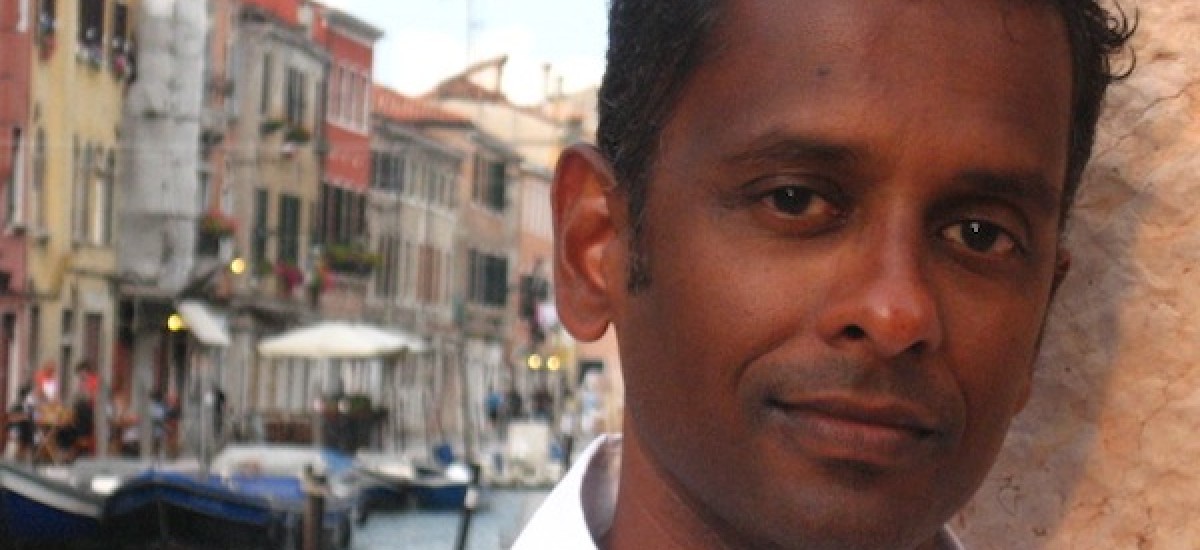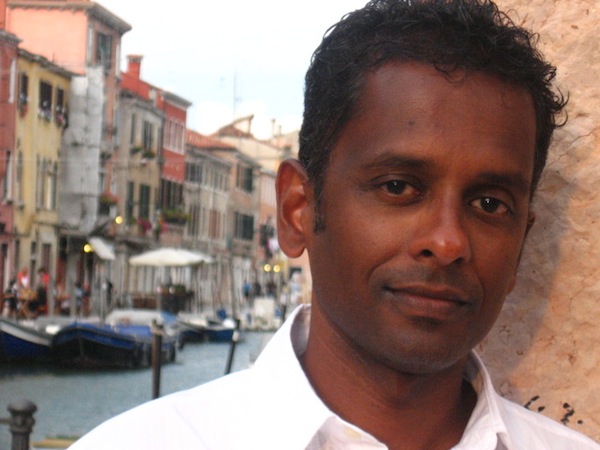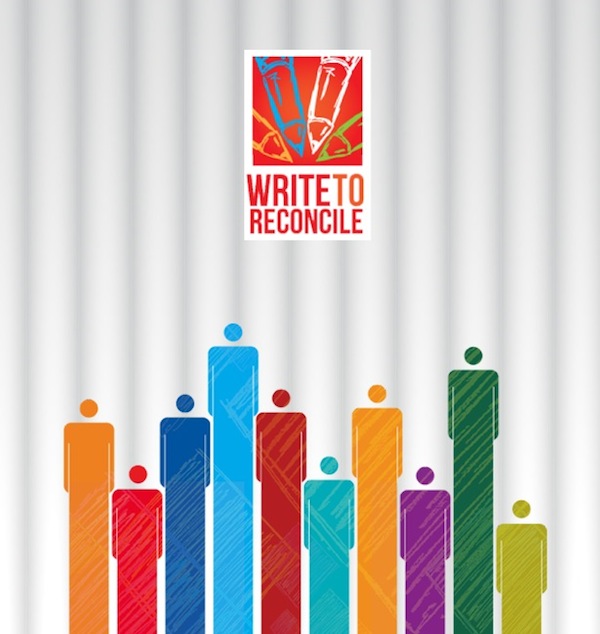Image courtesy Green College
I interviewed over email the award-winning author Shyam Selvadurai on a new initiative called Write to Reconcile, of which he is Project Director. Groundviews featured an in-depth interview with Shyam in mid-2011, when he was the curator of the Galle Literary Festival. Write to Reconcile is his brainchild, and I was curious to find out what drove him to think of it, and the challenges around doing this kind of work in a country post-war, but very far removed from a just peace.
###
What gave rise to this idea?
I first began to think of the project during the last Galle Literary Festival. While I enjoyed many aspects of my job as Festival Curator, the thing I enjoyed most this year was taking the children’s author and story teller, Jeeva Ragunath, to Jaffna to do storytelling workshops there. The response of both students and teachers there really moved me and made me want to do something similar. I love to teach and I began to think of some way to combine this love of teaching with reconciliation and capacity building. The other thing that I was really proud of having begun at the festival was the North South University Collaboration that brought together students from around the country who met at the festival, saw events and used these events to speak to each other across their divides. Meeting the students who participated in this event was also inspiring and it made me want to take a programme like that to another level of even deeper engagement. I wanted to use creative writing as a medium to build bridges. I feel that story telling is a very important way for people to get to know each other because, in stories or poems, unlike in essay and journalistic pieces, the thoughts and feeling of characters (whether real or imaginary) provide a human connection between writer and reader. This builds empathy and understanding between peoples and communities who think differently. I am currently reading a lot of old Sanskrit Literature in translation, and it is interesting that say, in the Mahabarata, the act of telling the story of that war, of story telling itself, is seen as a healing action. Those who listen to stories in Sanskrit literature, gain a lot of merit doing so.
There’s a pun, intended or not, in the title of the project. Do you think communities in post-war Sri Lanka enjoy the right to reconcile?
The pun is definitely intended. No, unfortunately, I don’t think that communities in post-war Sri Lanka enjoy the right to reconcile. Such a process has to be multi-faceted with each community deciding and defining how they want to do this process of reconciliation and honouring the dead. I don’t think that Tamil people feel they have any control over this process at all. And I do wonder how the Muslims feel as well, because they too have suffered such loses during the civil war. But beyond that, of course, there needs to be some national process of basically story telling and healing. Truth and Reconciliation Commissions are flawed things and are often state theatre, even in the best circumstances such as South Africa. However, flawed as they are, like Democracy, they are the the best tools we have at the moment.
In an article published in the Daily News, you note that “A very important way to heal our past wounds and move forward as a country is through telling our stories. Creative work, be it fiction, poetry or memoir, allows us to emotionally understand and empathize with the viewpoints, memories and experiences of others. Art, in all forms, has always played a very important role in healing wounds and also building tolerant, pluralistic societies.” From my own experience of editing a book based on a call for fiction, writers responded through their own experience, shared memories and the real, bloody history of Sri Lanka. How will you negotiate the complex and indeed, traumatic terrain of fiction and catharsis that may be the result of these workshops on writing?
I am really hoping I get a proper diversity of views, in terms of applicants. With this expectation, I am putting in place some guidelines for how participants will talk about each other’s work and how they will respond to each other’s thoughts and opinions, particularly things participants might not agree on. The main thing is goodwill and respect. You don’t have to agree with everything someone says but you must respect their right to have that opinion. I don’t see how it could be different in Sri Lanka, where there is such a diversity of views and opinions. I guess it helps to be coming from a country like Canada, where, as a teacher in university, negotiating a plethora of diverse opinions and cultural expressions is pretty much a given in a classroom. I do, however, feel the need to stress that the workshops and online forums are not a mini truth and reconciliation commission. The purpose of the workshops is to teach creative writing skills that are then applied to the subject of our civil war. I really believe personally in giving people skills and then letting them decide how they want to use them. What I dislike very much is the foreign expert (and lets face it, I am coming from elsewhere, even though I am Sri Lankan) sitting people in a circle and then listening all misty eyed while they pour out their sorrows and then offering in return some touchy-feely exercises that teach nothing really about the craft of writing.
In the context of the project, who is a ‘Sri Lankan writer’? In the Daily News article, it’s noted that the “project is open to all applicants who have Sri Lankan or dual citizenship between ages 18-29.” Arguably, someone born in Sri Lanka and for whatever reason left the island as infant or child, especially if brought up in an Anglophone country, has greater writing skills than an underprivileged citizen from within the country, who you are also trying to attract. How will you address this to ensure fair representation?
I put in the dual citizenship bit because I am a dual citizen and I felt there was something fake about me, as a dual citizen, not opening it up that way. Also there is now a growing cohort of dual citizens who have returned to participate in post-war Sri Lanka. Do they have greater writing skills? That is left to be seen. I make no such assumptions. Writing skills, however, can be taught. The people I am interested in having as participants are those who have passion and intelligence and can tell a story. I would pick a participant who has these qualities but, say, poorer grammar or writing skills, over a participant who has very good writing skills but has nothing really interesting to say.
A criticism usually levelled at projects that are conducted in English alone, especially around reconciliation, is that it doesn’t address or stem from the psyche of the majority in Sri Lanka. Is it important to you that the final submissions are translated into Sinhala and Tamil, even if the project itself was limited to English writing? If not, why not?
Yes, I will consider translation for sure. But, more than that, I would love to help facilitate similar projects in Sinhala and Tamil. Hence the reason why I have also included teachers as participants. But, for this first year, I was keen that Write to Reconcile does not bite off too much. Let’s keep it small, get it right and then expand.
There are two residential workshops – one in Colombo, and the other in Jaffna. Why did you feel it’s important to have a residential workshop in Jaffna for all participants?
I felt that Jaffna has been cut off from the rest of Sri Lanka for a while and it is important for people outside the North to experience it. I really love Jaffna, the landscape, the elegance of its people, and I wanted to share that love with the workshops participants as well. Also I think these cultural exchanges are very important if we are to prevent us ever slipping back into a war again. But also, in terms of writing, I really want the participants to understand that their writing takes place in a broader context and that this broader context feeds artistic work. Hence the cultural tours, the screening of films, the visits by local artists, the discussing of essays and stories during the online forum. When I first conceived of the project there were going to be 4 residential workshops- Colombo, Kandy/Galle, Batticaloa and Jaffna. However, I felt this was once again too much to bite off in the first year. I went with Colombo and Jaffna because they are two very different places and also because I felt I knew them well enough, had enough contacts in both places, to allow the project to run smoothly. If I do Write to Reconcile again, the locations will change.
As the Project Director of ‘Write to Reconcile’ how will you negotiate your own bias when shaping the writing of the participants? Have you done this kind of work before, and what experience do you have negotiating difference, especially when it is markedly different to your own beliefs and orientations?
This question of being aware of and negotiating ones own bias is complex one. I run into it all the time when teaching creative writing at York University, the University of Toronto and the various writers in residences I have done at universities. It’s not just political biases, there is also the bias of what work you like or dislike as a writer. I am not a big fan of the beat writers and yet white male students tend to love writers like Jack Kerouac. I have to be aware of this and put my biases to a side. How do I do this? In the good old Buddhist way: Be aware of the rising feeling of distaste, step back and have a look at the feeling. Then I try and separate my biases from actual creative issues in the work before you. But, in the more concrete terms of Write to Reconcile, I will set in place certain criteria by which I and also the other participants will respond to work in the workshops. For example, it is not helpful to say to a fellow writer, “Oh, I like/dislike your work.” This gives the writer nothing. Instead there is a checklist of things we look for in a work- how does plot, character etc work. What is the genre of the work? How does it fulfill the criteria of the genre? How does it intelligently challenge the borders of the genre? This checklist is a contract between us. We all adhere to it. Both students and teacher. This avoids for painful, harsh criticism.
As an award winning author and with your experience of curating the Galle Literary Festival for two years, what is your take on Sri Lankan fiction today, especially post-war? Do you see a growth in the quality and quantity of writing? Are there aspects you would like to see more of in the writing published today?
I don’t really see any change in quantity and quality. Some years there is a bumper crop of good work, some years it is thin. Just like it is in the West. The really good writers were writing during the war and so continue to work on whatever interests them post war. What concerns me is the general atmosphere of fear and stifling of dissent and the resulting self-censorship. I worry that writers’ work will become trivial because they are frightened to deal with the great and interesting material of Sri Lanka’s recent past and present because it might be conceived of as controversial and might offend the powers that be.
What do you hope the final anthology will achieve, and how will it be disseminated (i.e. just in print, or in e-book form, for free, or sold?)
I hope that the final anthology will add to the diversity of voices and opinions that any truly democratic society needs. The book will be distributed free to libraries and community associations across the country and also a small amount will be sold. In the end, though, one cannot really judge the true impact of a book until is it out there. I know this as a writer myself. I can never tell how my book is going to impact. One just puts it out there and waits to see the effect.
What’s your own take on the possibilities of reconciliation in post-war Sri Lanka, given what you know of a familiar litany of issues anchored to violent ground realities, a corrosive political framework, the fate of the LLRC’s recommendations, the militarisation of society, the shrinking space for critical voices and the phenomenon of disappearances and abductions? How do you think, beyond the publication of a book, this project can address this depressing context?
Yes, the situation is depressing and dismaying. Yet one must have hope for change and I feel I simply cannot sit on my hands and wait for that change to come. I must do something and what I can do is teach writing in the context of airing our past. A Sri Lankan friend who is a good deal older than me said something very interesting that I hold to whenever the situation in Sri Lanka gets me down: History has many streams that feed it and you never know which one is going to swell the main river and push it forward. I don’t know what this project will feed into that main river and what it will contribute to the pushing forward of history. Only time will tell that.
Finally, why write? Is it not better to silently endure and risk less, than write and risk exclusion, insult, violence and loss?
I am a writer who has dedicated my life to writing, so the question of why write seems besides the point. I believe in the power of story, to change us. How about I offer instead the final words from the Mahabarata that are an affirmation of the power of story:
“He who recites the Mahabarata tales attains the highest perfection – of this I have no doubt…. if a man studies it as he hears it recited, what need has he to bathe in the waters of holy Lake Pushkara?”



